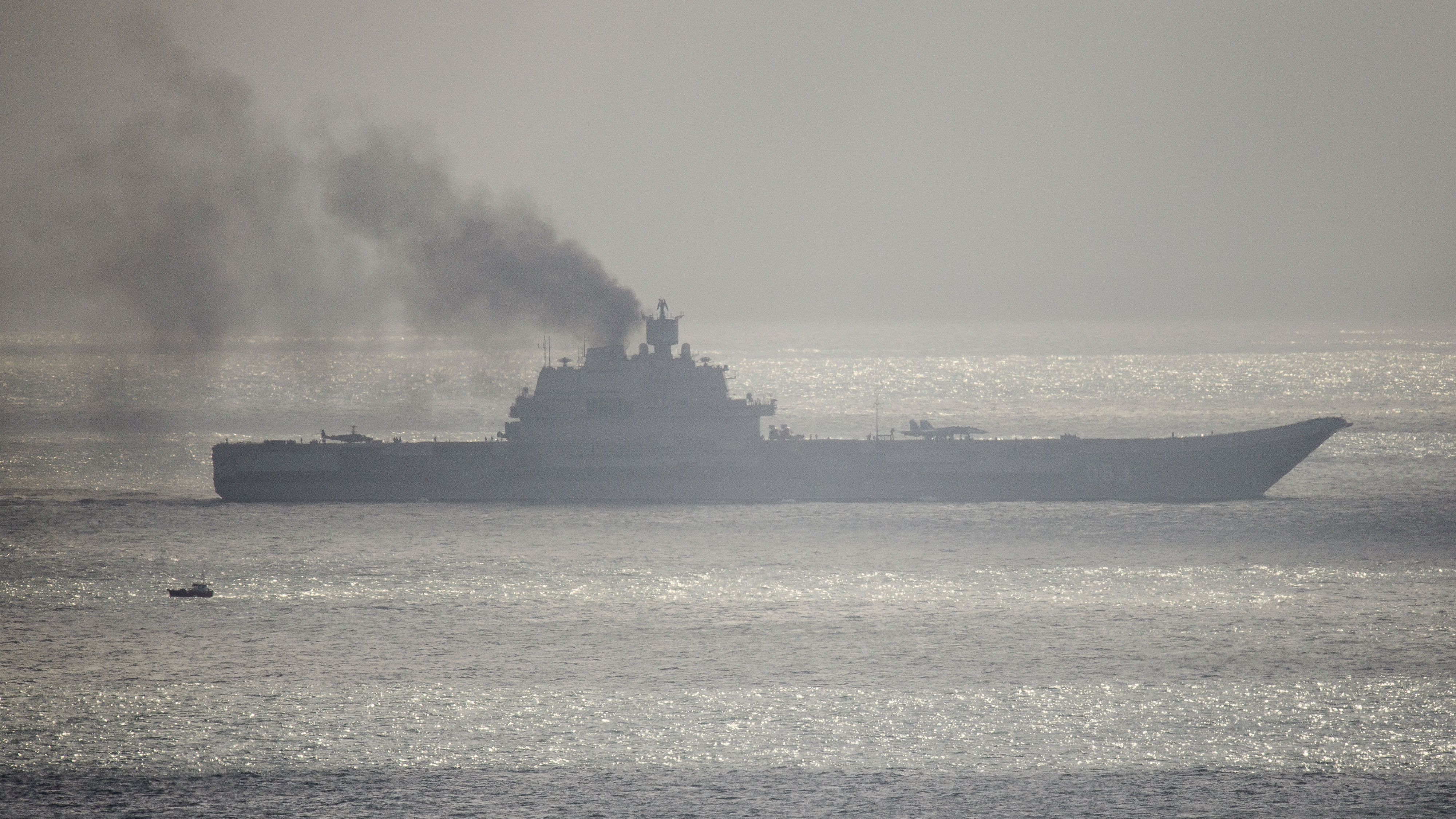Russia begins military withdrawal from Syria
President Vladimir Putin orders aircraft carrier to return home after ceasefire deal

A free daily email with the biggest news stories of the day – and the best features from TheWeek.com
You are now subscribed
Your newsletter sign-up was successful
Russia is scaling back its military involvement in the Syria conflict, starting with the withdrawal of its only aircraft carrier, the Admiral Kuznetsov, the country's top general has confirmed.
Chief of Staff General Valery Gerasimov said: "In accordance with the decision of the supreme commander of the Russian armed forces Vladimir Putin, the Russian defence ministry is beginning the reduction of the armed deployment to Syria."
The announcement comes a week after Syrian President Bashar al-Assad's regime reached a ceasefire deal with rebel forces. Peace talks are expected to begin later in Kazakhstan this month.
The Week
Escape your echo chamber. Get the facts behind the news, plus analysis from multiple perspectives.

Sign up for The Week's Free Newsletters
From our morning news briefing to a weekly Good News Newsletter, get the best of The Week delivered directly to your inbox.
From our morning news briefing to a weekly Good News Newsletter, get the best of The Week delivered directly to your inbox.
Russia's air strikes, which began merely hours after being approved by parliament in 2015, "helped turn the tide in favour of the Syrian government's ailing forces" by breaking the stalemate which dominated the early stages of the conflict, says Al-Jazeera.
At the time, Putin said Russia was acting "preventatively, to fight and destroy militants and terrorists" and the Kremlin has maintained that its bombers have exclusively targeted jihadists.
However, Moscow has been accused of committing war crimes by knowingly bombing civilians and moderate, western-backed rebel forces.
"The Assad regime and Russia make the Islamic State (ISIS, ISIL, Daesh) look hesitant by comparison when it comes to mass homicide in Syria," says The Atlantic.
A free daily email with the biggest news stories of the day – and the best features from TheWeek.com
The magazine also claims that the two countries' joint operation to retake rebel-held eastern Aleppo included strikes on "aid convoys, hospitals, homes, market places, and mosques".
As for why Russia has chosen to withdraw from the conflict now, with rebels still in control of much of Idlib province, the answer may lie in the divergence between Assad's objective – to re-establish control of the whole of Syria - and Moscow's own motivations.
"Unlike Syria and Iran, Russia has no interest in fighting for territory," Michael Kofman of the Wilson Center's Kennan Institute, told the BBC.
The Kremlin's goal has been to "steadily destroy the moderate Syrian opposition on the battlefield, leaving only jihadist forces in play", he says, ultimately "leaving no viable alternatives for the west in this conflict come 2017."
-
 Local elections 2026: where are they and who is expected to win?
Local elections 2026: where are they and who is expected to win?The Explainer Labour is braced for heavy losses and U-turn on postponing some council elections hasn’t helped the party’s prospects
-
 6 of the world’s most accessible destinations
6 of the world’s most accessible destinationsThe Week Recommends Experience all of Berlin, Singapore and Sydney
-
 How the FCC’s ‘equal time’ rule works
How the FCC’s ‘equal time’ rule worksIn the Spotlight The law is at the heart of the Colbert-CBS conflict
-
 Epstein files topple law CEO, roil UK government
Epstein files topple law CEO, roil UK governmentSpeed Read Peter Mandelson, Britain’s former ambassador to the US, is caught up in the scandal
-
 Iran and US prepare to meet after skirmishes
Iran and US prepare to meet after skirmishesSpeed Read The incident comes amid heightened tensions in the Middle East
-
 Israel retrieves final hostage’s body from Gaza
Israel retrieves final hostage’s body from GazaSpeed Read The 24-year-old police officer was killed during the initial Hamas attack
-
 China’s Xi targets top general in growing purge
China’s Xi targets top general in growing purgeSpeed Read Zhang Youxia is being investigated over ‘grave violations’ of the law
-
 Panama and Canada are negotiating over a crucial copper mine
Panama and Canada are negotiating over a crucial copper mineIn the Spotlight Panama is set to make a final decision on the mine this summer
-
 Why Greenland’s natural resources are nearly impossible to mine
Why Greenland’s natural resources are nearly impossible to mineThe Explainer The country’s natural landscape makes the task extremely difficult
-
 Iran cuts internet as protests escalate
Iran cuts internet as protests escalateSpeed Reada Government buildings across the country have been set on fire
-
 US nabs ‘shadow’ tanker claimed by Russia
US nabs ‘shadow’ tanker claimed by RussiaSpeed Read The ship was one of two vessels seized by the US military